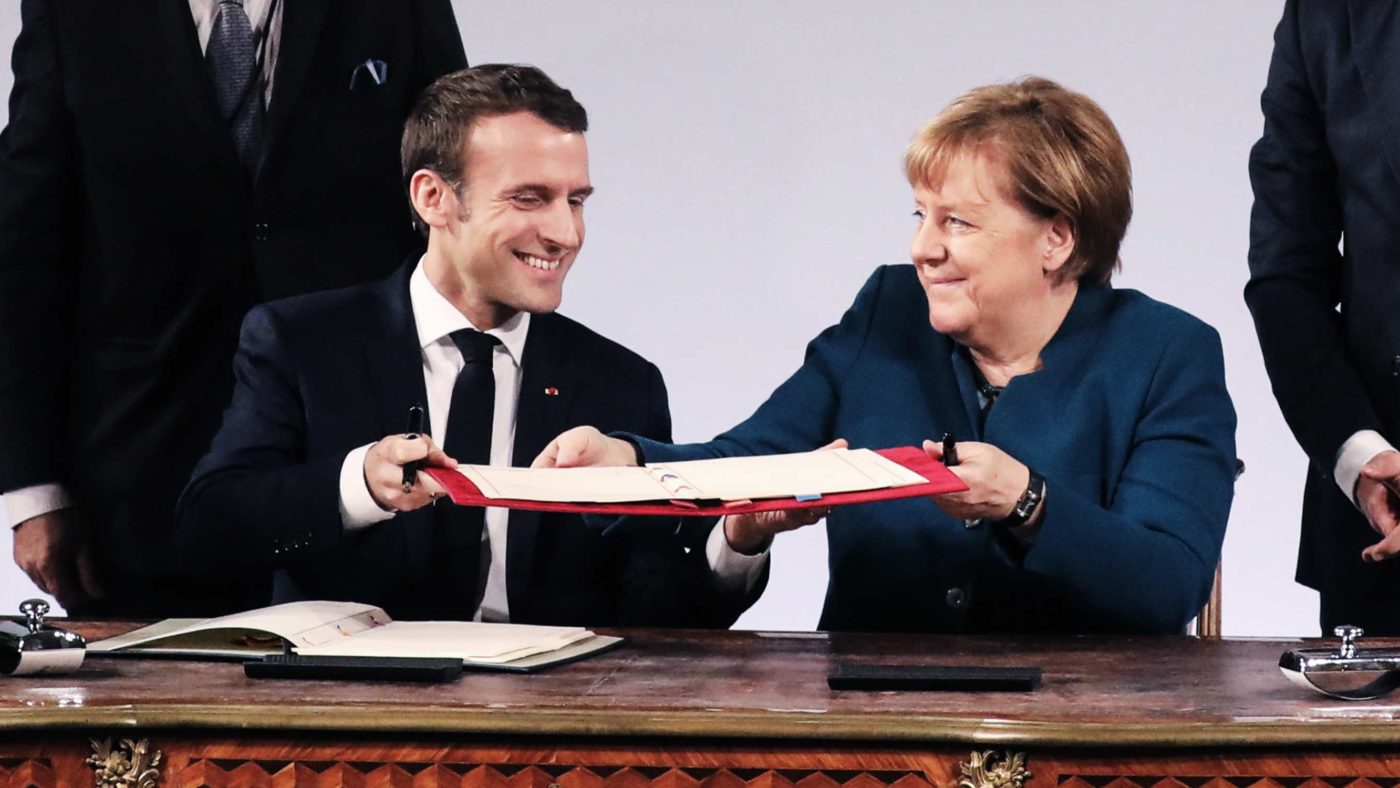While all eyes were on Davos this week, the German and French governments were having an altogether more significant pow-wow in the western German city of Aachen. It was in the same place, once Charlemagne’s capital city, that Emmanuel Macron received, appropriately enough, the Charlemagne Prize for his work in the service of European unity.
This time Macron and Angela Merkel were in town to sign a new treaty to intensify their countries’ cooperation on EU politics, security and foreign policy, and trade. The immediate reaction to the new agreement was one of concern in many quarters. After all, an even closer relationship between Europe’s two biggest powers will have profound consequences.
Curiously enough, the EU hierarchy was not at all happy about this development. After all, Eurocrats are vehemently opposed to any attempts to develop parallel structures to the European Union. Commission President Jean-Claude Juncker and European Council President Donald Tusk both sought to underline that it is not only France and Germany who are enthusiastic about European integration.
As Tusk put it, “to the east of Germany there are hundreds of places where the European spirit of a place — genius loci — is felt as strongly”. His argument is that instead of daring to go it alone, France and Germany should focus on the EU as the only cooperative tool for countries. “Let me put it very bluntly,” Tusk warned. “Today Europe needs a clear signal from Paris and Berlin that enhanced cooperation in smaller formats is not an alternative to the cooperation of Europe as a whole.”
But while the reactions from EU institutions can be brushed off as an institution going into full jealous girlfriend mode, there are also serious concerns among smaller member states that an enhanced Franco-German relationship will mean ever more pressure on smaller countries to deepen European political integration.
The Czech MEP Jan Zahradil, for instance, warned that “a Franco-German axis that goes around other member states to stitch up EU business is exactly what we feared when the UK announced their intention to leave”.
And indeed, at first sight, this makes sense. For example, the Treaty announces both countries’ intention to fight for a common European security and foreign policy (European army, anyone?) and strengthening and deepening of the economic and currency union (Euro for all member states and more burden-sharing, anyone?). Seen alongside the Commission’s recent attempts to silence the voice of smaller member states, this kind of language should certainly put people on their guard.
Nonetheless, if the Aachen Treaty shows anything, it is the current weakness of both France and Germany’s current governments. As many observers have noted, the treaty major on empty expressions of mutual amity, but is remarkably light on detail. Indeed, the only conclusion that is slightly concrete – lowering trade barriers and harmonising regulations, was described by Merkel as a project that would “take two decades”.
The fundamental emptiness of the agreement is not all that surprising. Both Macron and Merkel have well-documented domestic problems. For the German Chancellor, this has been clear for quite some time, as she stepped down as party chief in December. Coupled with a party where a significant number of members are unhappy both with Merkel and the idea of ever closer European integration, it is clear that Merkel does not have much room for manoeuvre, particularly on the European stage.
Meanwhile, “King Emmanuel” has embarrassingly low approval numbers and has been distracted by the Gilet Jaunes protest movement. His ambitious plans for European reform in 2018 hit the buffers after opposition from both Merkel and a number of smaller member states. With his domestic travails, the prospect of realising the kind of fundamental changes to the EU he envisaged when he became president looks ever more remote.
As Politico’s Matthew Karnitschnig has noted: “The Treaty of Aachen’s greatest contribution might be to put in black and white just how little Macron has won from Berlin on Europe.”
So what would it mean for Europe if the situation stays the same, with both France and Germany sidelined in debates to a certain extent, with both leaders merely trying their best to hang on to power, and with an outgoing Commission that can only do so much anymore until the elections in May?
With the leaders of the two most important member state both focused on hanging on to power and an outgoing Commission whose hands are tied until May’s parliamentary elections, what does the future hold for reforming the EU?
On a normal trajectory, it would mean a continuation of gradual integration, with a middle ground between the more enthusiastic French, backed by some southern states, and the less enthusiastic Germans, backed by some northern allies. This is generally how things have been done in the past, when both governments were relatively stable.
Thankfully, the current stasis gives a welcome opportunity for those opposed to ever-deepening European integration to make their voices heard. There are, of course, vocal groups on the right who expect major gains in May’s elections, regardless of how divided they actually are. But there are also those arguing for a Europe which sticks to its liberal principles, focuses on free trade and enterprise and stops interfering in member states’ affairs – the kind of Europe envisaged by Margaret Thatcher, in which sovereign states cooperate with one another for their mutual benefit.
Ironically, this week’s events in Aachen showed that the time is ripe for those who want real reform in Europe, not just endless centralisation towards Brussels. With both the French and German governments weakened, it’s time the forces of liberalism to make the case for a truly free Europe.


